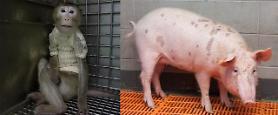Thanks to a powerful new gene-editing technique, scientists have overcome a major hurdle for humans to receive life-saving organ transplants from pigs.
In a paper published in the latest issue of the U.S. journal Science, the researchers described using the CRISPR editing method to remove potentially harmful DNA sequences at 62 locations, which are the remnants of a virus, called “porcine endogenous retrovirus (PERV),” from the pig genome.
Worldwide, human organs for transplant are in short supply. Researchers and clinicians have long hoped that the challenge could be alleviated through the availability of suitable animal organs for transplant, a concept known as “xenotransplantation.”
Pigs, in particular, have been especially promising candidates, due to their similar size and physiology to humans. In fact, pig heart valves are already commonly sterilized and de-cellularized for use repairing or replacing human heart valves.
But one of the largest safety concerns has been the fact that most mammals, including pigs, contain repetitive, latent retrovirus fragments in their genomes, present in all their living cells, that are harmless to their native hosts but can cause disease in other species.
By Ruchi Singh
In a paper published in the latest issue of the U.S. journal Science, the researchers described using the CRISPR editing method to remove potentially harmful DNA sequences at 62 locations, which are the remnants of a virus, called “porcine endogenous retrovirus (PERV),” from the pig genome.
Worldwide, human organs for transplant are in short supply. Researchers and clinicians have long hoped that the challenge could be alleviated through the availability of suitable animal organs for transplant, a concept known as “xenotransplantation.”
Pigs, in particular, have been especially promising candidates, due to their similar size and physiology to humans. In fact, pig heart valves are already commonly sterilized and de-cellularized for use repairing or replacing human heart valves.
But one of the largest safety concerns has been the fact that most mammals, including pigs, contain repetitive, latent retrovirus fragments in their genomes, present in all their living cells, that are harmless to their native hosts but can cause disease in other species.
By Ruchi Singh
Copyright ⓒ Aju Press All rights reserved.




